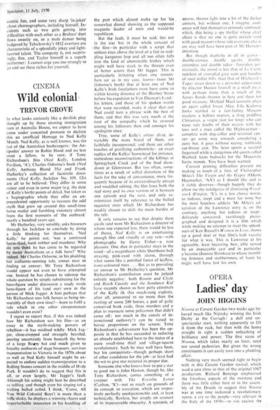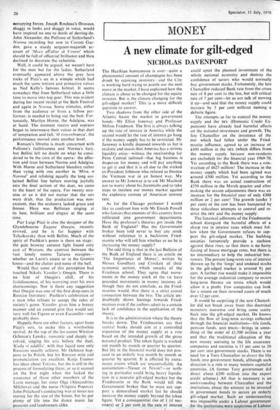OPERA
Ladies' day
JOHN HIGGINS
Norma at Covent Garden two weeks ago be- haved much like Nijinsky winning the Irish Derby at the Curragh : a dull and un- spectacular start, nothing apparently to lift it from the ruck, but then with the home straight in sight a sudden unleashing of brilliance and power. The first scene of Norma, which takes nearly an hour, need not sound pedestrian. But given the wrong constituents it can easily turn into a plodding affair.
Nothing very much seemed right to begin with in this Covent Garden revival, which used a cast close to that of the original 1967 production. Richard Bonynge emphasised. the frivolous aspects of the overture and there was little either here or in the assem- bly of the Druids to suggest that Norma was at one time reckoned a revolutionary opera, a cry to the people—very relevant in the Italy of the 1830s—to rise against the
occupying forces. Joseph Rouleau's Oroveso, shaggy in looks and shaggy in voice, would have inspired no one to deeds of derring-do. John Alexander, the Pollione of Sutherland's Norma recording but new to Covent Gar- den, gave a sturdy sergeant-majorish ac- count of 'Meco all'altar di Venere' which should be full of officerial brilliance and then declined to decorate the cabaletta.
Well, it could be argued, we weren't here for the men but for the ladies. Sutherland eventually appeared above the grey lava rocks of Pizzi's set in a wimple which had much the same texture and protective values as Ned Kelly's famous helmet. It seems nowadays that Joan Sutherland takes a little time to move into top gear. This was evident during her recent recital at the Bath Festival and again in Norma. Some stimulus, either from the audience or from a fellow per- former, is needed to bring out the best. For- tunately, Marilyn Horne, the Adalgisa, was at hand. The moment mezzo and soprano began to interweave their voices in that duet of temptation and fall, '0 rimembranza', the performance moved onto another level.
Romani's libretto is much concerned with Pollione's faithlessness and Norma's fury, but Bellini left no doubt on what he consi- dered to be the core of the opera: the affec- tion and trust between Norma and Adalgisa. With Home and Sutherland blending rather than vying with one another in 'Mira, o Norma!' and relishing equally the long sus- tained Bellini line before moving joyfully into the final section of the duet, we came to the heart of the opera. For twenty min- utes or so it did not matter that the sets were drab, that the production was non- existent, that the orchestra lacked grace and finesse. Here was Bellinian singing at its best, brilliant and elegaic at the same time.
Pier Luigi Pizzi is also the designer of the Glyndebourne Eugene Onegin, recently revived, and he is far happier with Tchaikovsky than with Bellini. Much of the spirit of Pushkin's poem is there on stage: the pale browny autumn light found only east of Warsaw, the contrast between the vast lonely rooms Tatiana occupies— whether on Larin's estate or in the Gremin home—and the clutter and noise of the ball.
Would that some of this perception had touched Nikola Vassilev's Onegin. There is no hint of Onegin's chill, of his fastidiousness, of his worrying over his own shortcomings. Nor is there any suggestion that Onegin was one of the first drop-outs in Russian literature: Pushkin's celebration of a man who refuses to accept the rules of society's game. Vassilev gives him a breezy manner and an assured grin that would suit very well for Figaro or even Escamillo—and probably does.
Happily there are other factors, apart from Pizzi's sets, to make this a worthwhile revival. At the top of the list comes Wieslaw Ochman's Lensky, romantic and deeply in- volved, singing his aria before the duel, 'Kuda vi udalilis', with that liquid tone only Russians usually achieve. Mr Ochman hap- pens to be Polish, but his Russian style and pronunciation are excellent. Katja Usunov has ideas about Tatiana, but she is still in the process of formulating them; or so it seemed on the first night when she lacked the assurance of those other members of the Larin menage, her sister Olga (Alexandrina Milcheva) and the nurse (Virginia Popova). John Pritchard's conducting was at times too stormy for the size of the -house, but he put plenty of life into the dance music for peasants and landowners alike.































 Previous page
Previous page